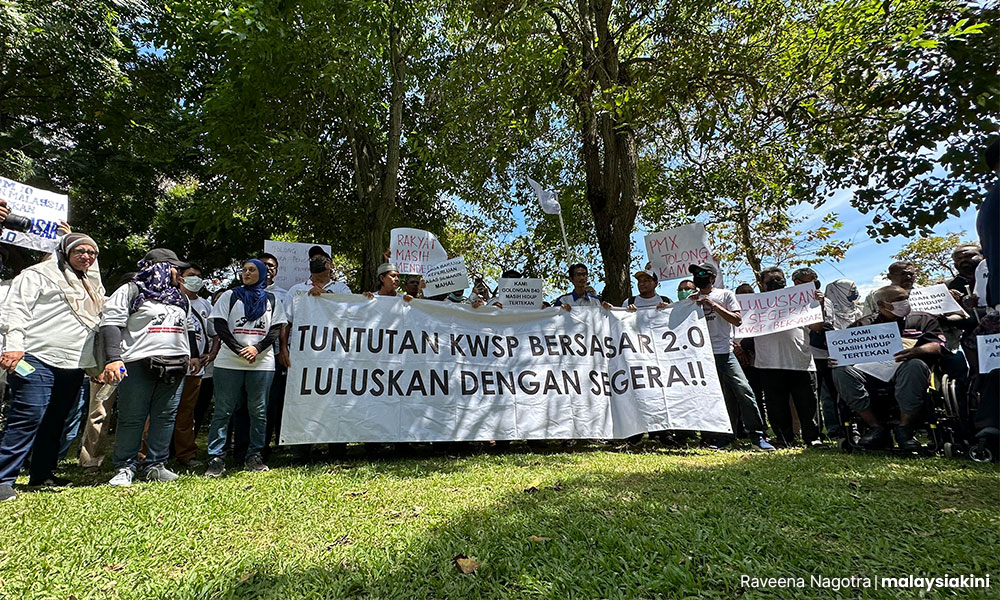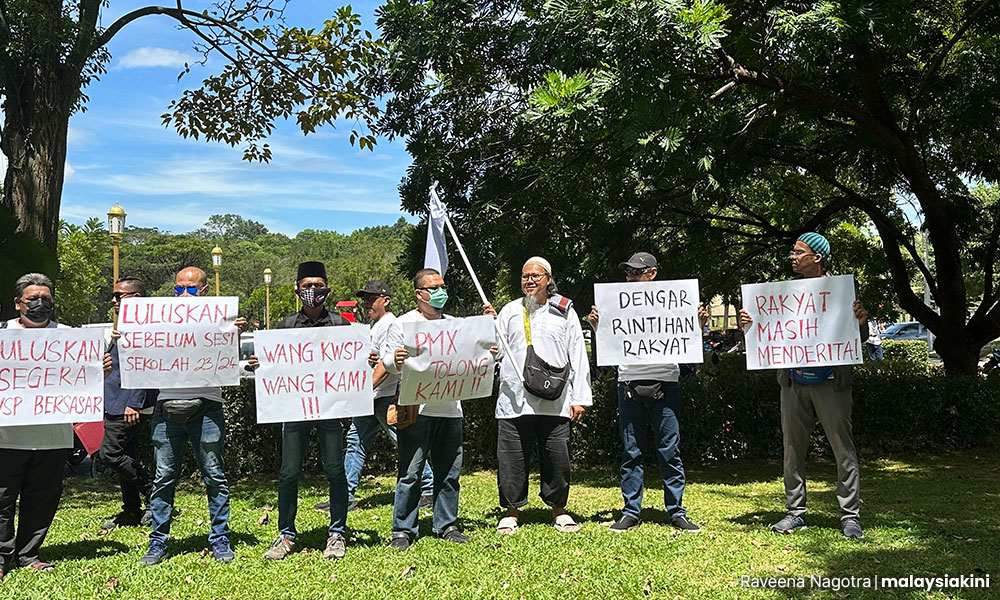Despite the government having rejected calls for another round of withdrawal from the Employees Provident Fund (EPF), several contributors insist to have their plights heard.
Gathering outside the Prime Minister’s Office earlier today, several NGOs representing some 320,000 EPF contributors demanded access to the fund in order to settle their debts and cope with the rising cost of living.
Yesterday, Deputy Finance Minister Ahmad Maslan said no EPF withdrawals will be allowed as the median savings in the EPF accounts of all Malaysians declined by 50 percent to RM8,100 in 2022 from RM16,600 in the year before the Covid-19 pandemic hit.
He said more than RM145 billion had been withdrawn by 8.1 million EPF contributors under four withdrawal schemes in the time period, namely the i-Lestari, i-Sinar, i-Citra, and a special withdrawal.
Ahmad added that Malay EPF contributors, who number more than seven million members, had an average of RM16,900 in April 2020 but are now only left with about RM5,500.
He said that the median savings of EPF members of other bumiputera groups, which comprise 1.4 million members, fell to RM3,300 compared to RM10,600 before the pandemic.
In response to this, Global Human Rights Federation president S Shashi Kumar said it was easy for Ahmad to deny the people further withdrawals as he did not have to deal with the same issues.

“He has a big house, his car and petrol are paid for by the government. So are his handphone, electricity, and water bills.
“What about us? We have to pay for these things ourselves. We have to remember that without the rakyat, there is no government.
“...We don’t want to beg, this is our right. The government’s duty is to take care of the rakyat. Many people are sleeping in their cars, unable to pay for their houses - who are they meant to cry to?” he said.
More than half have ‘extremely low savings’
Meanwhile, NGO Pertubuhan Gagasan Inovasi Rakyat Malaysia (PGIRM) vice-president Mohammad Farhan Jailani claimed that the NGO has collectively received 320,000 complaints from contributors who were in trouble and needed access to their funds immediately.
The NGO conducted a survey among 226,996 of the complainants, 45 percent (102,339) of whom are between the ages of 36 and 45.
Some 30 percent (67,327) of respondents are between 26 and 35 years old, followed by 20 percent (46,356) in the 46 to 44 years old category, and 5 percent (10,974) aged 18 to 25 years old.
About 41 percent of respondents (93,293) said that they needed the money to cover household expenses due to inflation and the rising prices of goods, whereas 35 percent (77,928) reported that they needed the money to settle their debts.
On the other hand, 11 percent (24,941) said they needed money due to reduced income, followed by 6 percent (6,556) reporting a loss of dual income, 3 percent (7,352) loss of single income, and 1 percent (2,659) reporting illnesses.
It was reported on Jan 24 that 51.5 percent, or a total of 6.67 million of EPF contributors, have “extremely low” savings of less than RM10,000 in their accounts.
However, in another survey conducted by PGIRM among 136,137 contributors, over 75 percent of respondents had a balance of more than RM10,000.
PGIRM, GHRF, the Muslim Consumers’ Association, and the Independent Living and Training Centre Malaysia were present in Putrajaya today to hand over their memorandums.

The memorandums were received by special officer in the Prime Minister’s Department Muhammad Fikri Khalid.
Prime Minister Anwar Ibrahim has been firm in his decision not to allow another round of EPF withdrawals, claiming the move would negatively affect contributors who are retiring soon.
Anwar assured that Putrajaya is looking at other ways to help ease the people’s financial burdens without compromising their post-retirement survival.
He added that the government would employ several strategies to help the rakyat in its 2023 budget, to be tabled in Parliament on Feb 24. - Mkini




No comments:
Post a Comment
Note: Only a member of this blog may post a comment.